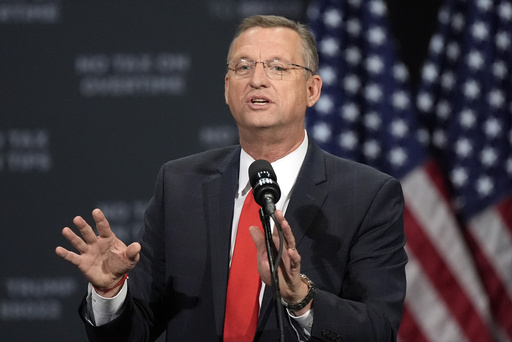
ATLANTA – President-elect Donald Trump recently declared his intention to appoint Doug Collins as the head of the Veterans Affairs Department in his incoming administration. This decision has raised interest, and here are five key points about the former Republican congressman from Georgia, who will oversee the agency dedicated to caring for the country’s veterans.
Doug Collins, aged 58, is not only a seasoned politician but also a Baptist minister who has served in both the Navy and the Air Force Reserve. He holds a master’s degree in divinity from the New Orleans Baptist Theological Seminary and spent 11 years pastoring a local church. His military career began as a U.S. Navy chaplain in the late 1980s, later transitioning to the U.S. Air Force Reserve after the September 11 attacks. In 2008, Collins spent five months deployed at Balad Air Force Base in Iraq and currently retains the rank of colonel in the Air Force Reserve. Additionally, he pursued a law degree later in life.
In terms of his political career, Collins has established himself in one of Georgia’s most conservative areas. He began his political journey in 2007 when he was elected to the Georgia state House, serving three consecutive two-year terms. During this time, he was a floor leader for then-Governor Nathan Deal, working on significant budget cuts that were crucial for sustaining the HOPE Scholarship program amid fears of financial instability. In 2012, Collins secured a position in Congress, representing the 9th Congressional District, known for its strong Republican majority, after the former incumbent was reassigned due to redistricting.
Despite the solidly conservative nature of his district, Collins faced substantial primary challenges in 2016 from fellow Republicans who criticized him for not being sufficiently conservative. Nevertheless, he ascended to a leadership role as the vice chair of the House Republican Conference during his time in Congress, which is one of the top positions in GOP leadership.
On a national stage, Collins garnered attention for his outspoken defense of Trump during the investigation led by special counsel Robert Mueller, which examined Russian interference in the 2016 presidential election. He authored a book titled “The Clock and the Calendar,” which focused on Trump’s first impeachment, arguing that it was driven by political revenge related to the 2016 election outcome. Collins has been vocal about his beliefs on the motivations behind the impeachment process, asserting it was excessively partisan.
Trump had initially hoped to see Collins appointed to the U.S. Senate in 2019 when the sitting Republican Senator Johnny Isakson retired due to health issues. Instead, Governor Brian Kemp opted for Kelly Loeffler after considerable pressure from various groups opposed to Loeffler. Collins launched his own Senate campaign in the following election, finishing third in the special election held in November 2020, which was ultimately won by Raphael Warnock. Despite these setbacks, Collins has hinted that his exit from the political scene may not be permanent, expressing ambitions for future political endeavors in Georgia.
Though Collins chose not to run against Governor Kemp or challenge for the Senate seat in the 2022 elections, he has continuously aligned himself with Trump, even chairing the Trump-supporting America First Policy Institute in Georgia. As he takes on the role of Veterans Affairs Secretary, it remains to be seen how this will affect his political aspirations, especially as Senator Jon Ossoff’s reelection looms in 2026.
